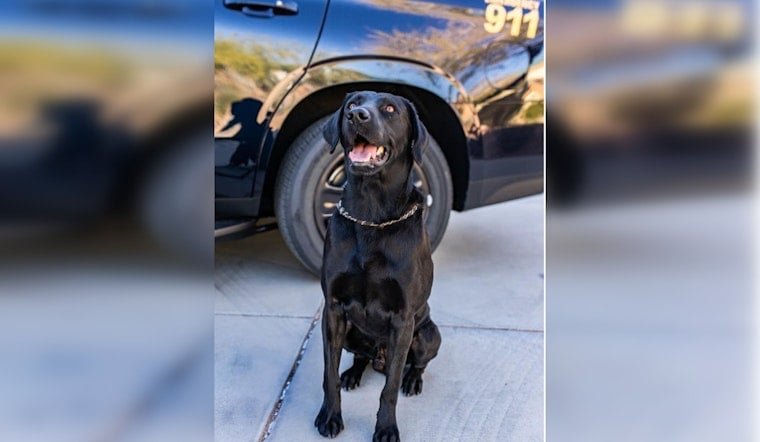We may earn a commission when you click on links across our website. This does not influence our opinions — learn more.
K-9 Marley’s Death Sparks Outrage as Officer Walks Free After Hot Car Tragedy

The death of K-9 Marley, a five-year-old black Labrador retriever who served with the Clark County School District Police Department, has left a community heartbroken and outraged after his handler escaped with no jail time.
On October 28, 2025, Officer James Harris pleaded no contest to a single misdemeanor charge of confining an animal in a vehicle. Felony counts of torture, abandonment, and failure to provide care were dismissed.
Justice of the Peace Nadia Wood sentenced Harris to time served — a ruling that has sparked fierce debate about accountability, justice, and the treatment of police animals who serve alongside their human counterparts.
A Tragic Day in a School Parking Lot
It was a quiet Thursday morning on November 14, 2024, when Marley reported for duty at Foothill High School with his handler.
Harris parked his patrol car on the south side of the campus shortly before 7 a.m. Marley remained inside, confined to the rear kennel area of the vehicle. Hours passed. Temperatures outside rose steadily. Inside, the sealed car became a furnace.
When Harris later returned to his vehicle — sometime during the school day, according to court documents that note he was assigned to Foothill High School throughout — Marley was already dead.
The precise time of discovery is not specified in official records, but it was clear that several hours had passed.
What stunned investigators most was that the tragedy was not the result of a sudden mechanical failure, but a deliberate act.
Harris had disconnected the vehicle’s heat sensor — a built-in safeguard designed to automatically lower windows, trigger fans, and alert officers if the temperature reached dangerous levels. It was a system created precisely to prevent deaths like Marley’s.
Harris later claimed he left the air conditioning on but admitted he never once checked on Marley during the six hours he remained inside the car. By the time he did, it was far too late.
A necropsy confirmed what was already clear: Marley died from heat-related illness. No other medical conditions were found.
Experts say that even on a mild day, temperatures inside a parked car can climb past 120 degrees in minutes.
Once a dog’s body temperature exceeds 104 degrees, heatstroke sets in. At 106, death or irreversible organ failure becomes almost inevitable.
Marley’s final hours were spent in conditions no living creature could survive.
A Legal Outcome That Sparked Outrage
Harris’s conduct quickly drew scrutiny from animal advocates and law enforcement watchdogs alike. Initially, prosecutors filed several felony counts, including animal torture and neglect.
But just days before his scheduled trial, Harris struck a deal. He pleaded no contest to the misdemeanor charge, and prosecutors dropped the rest.
The court accepted the agreement, sentencing Harris to “time served.” He walked free. No additional jail time, no probation, no fine.
Clark County District Attorney Steve Wolfson said the officer’s actions were “negligent” but did not meet the standard for malice required to pursue felony charges.
That explanation has done little to quell public outrage.
For many, the decision feels like a profound betrayal — not just of Marley, but of every taxpayer who expects justice to be applied evenly, regardless of badge or title.
“He didn’t forget his dog in the car,” one advocate said after the hearing. “He turned off the system that was supposed to save him. That’s not negligence. That’s a choice.”
The Community Reacts
The anger has been palpable online and across Las Vegas.
Residents have filled social media feeds with messages demanding reform, arguing that a police officer who disables safety equipment and leaves a K-9 to die should face the same consequences as any civilian.
Others have called for new oversight of police animal programs, questioning how a department could allow such a lapse to occur — and whether the officer responsible remains employed.
The Clark County School District did not immediately respond to requests for comment about Harris’s current employment status.
Marley’s death has also reignited debate about how law enforcement treats its canine partners. Police K-9s are more than equipment; they are trained officers in their own right, bonded to their handlers and entrusted with the same duty to protect and serve.
Marley was one of several dogs assigned to the district’s K-9 unit, trained to detect drugs, weapons, and explosives while helping ensure campus safety.
His training took months and cost thousands of dollars. But his value extended far beyond that.
To students and staff, he was a symbol of safety and loyalty — a working dog whose presence made schools feel secure.
A Pattern of Preventable K-9 Deaths
What happened to Marley is not unique. Dozens of police dogs die every year across the United States after being left in hot vehicles.
In some cases, mechanical failures are to blame. In others, human negligence. And in a few, like this one, the tragedy stems from a conscious act.
In 2021, two police dogs in Florida — Jimmy and Hector — died after being left in their handler’s car on an 86-degree day.
In Delaware, a K-9 named Caro succumbed to heat after just two hours inside a vehicle. The pattern is painfully familiar: preventable deaths, minimal accountability, and little systemic change.
Modern technology could prevent nearly all of these tragedies.
Professional-grade heat alarm systems, widely available for under $6,000, automatically monitor interior temperatures, open windows, trigger alarms, and send smartphone alerts if the heat becomes dangerous. Some can even unlock doors to allow dogs to escape.
These systems have saved countless K-9s — yet many police departments still do not install them, or allow officers to disable them without consequence.
Lessons From Marley’s Death
For now, the case stands as a grim reminder of how little protection exists for working dogs in the line of duty.
Animal advocates have urged all Nevada law-enforcement agencies to adopt mandatory heat-alarm systems, regular equipment checks, and independent oversight for K-9 programs.
They are also calling for policies that make it impossible for any handler who disables safety systems or leaves a K-9 unattended to escape with a misdemeanor.
Marley’s story has moved many to tears — not only because of the pain he endured, but because of what his death represents. He served loyally, protected others, and trusted his handler completely. That trust was betrayed.
For those who continue to fight for stronger laws, Marley’s name has become a rallying cry — a symbol of how compassion and accountability must go hand in hand. His death was preventable.
The question that now hangs over Clark County, and indeed all of Nevada, is whether the system will learn from it — or allow it to happen again.

